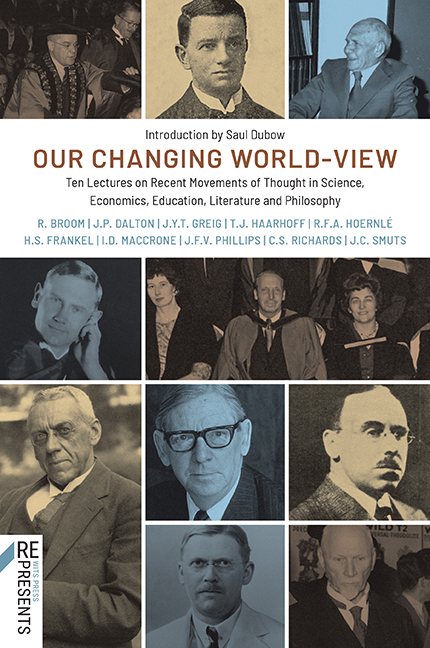 Our Changing World-View
Our Changing World-View Book contents
- Frontmatter
- Contents
- Introduction
- Preface
- Miscellaneous Frontmatter
- 1 Some Recent Scientific Advances in Their Bearing on Philosophy
- 2 The Material World—Yesterday and Today
- 3 Evolution—Design or Accident?
- 4 Man at the Crossroads
- 5 Psychology in Perspective
- 6 Literature in the Machine Age
- 7 The Holistic Attitude in Education
- 8 Our Changing Economic World
- 9 Africa in the Re-Making
- 10 Old Truths and New Discoveries
7 - The Holistic Attitude in Education
Published online by Cambridge University Press: 12 October 2021
- Frontmatter
- Contents
- Introduction
- Preface
- Miscellaneous Frontmatter
- 1 Some Recent Scientific Advances in Their Bearing on Philosophy
- 2 The Material World—Yesterday and Today
- 3 Evolution—Design or Accident?
- 4 Man at the Crossroads
- 5 Psychology in Perspective
- 6 Literature in the Machine Age
- 7 The Holistic Attitude in Education
- 8 Our Changing Economic World
- 9 Africa in the Re-Making
- 10 Old Truths and New Discoveries
Summary
A man once asked me why General Smuts, in writing about Hōlism, as he called it, had been so careless as to omit the w. A classical scholar may be pardoned for suggesting that if you refrained from doubling the quantity of the first vowel, you would have no need to look for a w. For Holism, as you know, comes from the Greek τὸ ὅƛον (the whole); and, as General Smuts used it in the sense of parts of Nature striving towards wholes, or “the fundamental factor operative towards the creation of wholes in the Universe,” so I propose to use it of the unifying factor in various portions of education that are incomplete and sterile until they are combined into a significant unity. I speak of an attitude of mind, not of an attempt to cover all knowledge, which could lead only to superficiality; of the quality in a man, be his learning never so humble, that prompts him to keep the windows of his spirit open and to avoid the darkness either of ignorant isolation or of priggish pedantry. And this attitude is possible in the boy who learns a trade in a technical college as well as in the university professor.
Now this attitude of mind is more easily described than defined. It implies that we value in education not merely the acquisition of a set of facts and the professional skill that enables us to earn a living (I have known august educational bodies who have valued only these), but also the understanding of relationships, the forging of living links between an abstract subject and human interests, the realization of perspective, the desire to see how a theme fits into a whole, of which it forms a part. Thus, Holism, Greek by etymology, is Greek also in significance, for it was Plato who first recognized the synoptic point of view in education. “The detailed sciences,” says Socrates, speaking of the Guardians, “in which they were educated as children, must be brought into the compass of a single survey to show the connection that exists between them and the nature of real existence.”
- Type
- Chapter
- Information
- Our Changing World-ViewTen Lectures on Recent Movements of Thought in Science, Economics, Education, Literature and Philosophy, pp. 145 - 164Publisher: Wits University PressPrint publication year: 2021
